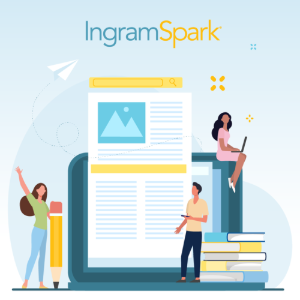The market for ebooks is growing: By 2027, Statista projects the number of e-reader users to grow to 1.1 billion, resulting in an expected revenue of $15.33 billion in the ebooks market. If you've not yet considered creating an ebook version of your print book, now is the time. As a self-published author, it's essential for maximizing success in today's digital-driven market.
If you're looking to expand your reach—and your earnings—here are six reasons you should consider self-publishing an ebook.
1. Greater Visibility
Forbes has reported that people spend more than 10 hours a day on their tablet, phone, or computer. Many people rely on their electronic devices for news, weather, socializing, work, and more, so they frequently expect their books to be accessible on these devices too. Offering an electronic version of your book allows you to tap into a digital audience that might not otherwise have been aware of it, much less purchased it.
- Convenience: Ebooks can be easily toted around in a purse, briefcase, or even a pocket.
- Sustainability: A draw for many readers, as the need for ink, paper, and shipping materials is eliminated.
- Instant Gratification: Readers don't have to wait for their book to be delivered or drive to the bookstore. One click of a button gives them what they want.
- Global Availability: They can be purchased and downloaded instantly from anywhere in the world, with no shipping or customs restrictions.
- Increased Accessibility: Visually impaired readers can adjust text size, font, and screen brightness easily, as needed.
2. Lower Production & Distribution Costs
One of the biggest advantages of self-publishing an ebook is the significantly lower cost compared to printed books.
- No Printing Costs: Printing a book can sometimes be costly, and extra expenses related to color printing, binding, and cover enhancements can add up.
- No Storage Costs: Ebooks exist digitally, so no storage/rental fees are necessary.
- No Inventory Expenses: No need for managing inventory levels or deciding what to do with unsold copies.
- No Shipping Fees: No logistical challenges related to the delivery of ebooks.
3. Higher Profit Margins
Ebooks typically offer a greater profit margin than print books due to their much lower production and distribution expenses. Once the digital file is prepared, costs are minimal, enabling a larger portion of the sale price to translate into profit.
- No Overhead: Authors can offer discounts and promotions more freely without losing money.
- Direct Sales: Authors can sell ebooks directly from their own websites, keeping 100% of the revenue.
- More Money for Promotion: Since more of the sale price goes to the author, you can focus more of your budget on marketing and advertising rather than logistics and production.
4. Greater Discoverability
Discoverability is your biggest marketing partner as it provides reliable, continuous passive marketing. Ebooks give you access to a broader audience through digital platforms.
- Indexed by Search Engines: Your book is easier to find through Google searches as well as retailer searches.
- Increased Visibility: Online bookstores categorize ebooks by genre, keywords, and metadata, making it easier for new readers to discover your book.
-
Unlimited Listings: While bookstores and libraries might have limited shelf space, online platforms allow for unlimited listings.
-
Access to Lending Services: Libraries purchase ebooks through services like OverDrive and Hoopla, putting books in front of more readers. Readers who enjoy your book may just want to purchase more of your work.
5. Expanded Promotional Opportunities
Ebooks open up more flexible, cost-effective, and global promotional strategies compared to print books. They allow you to reach more readers, experiment with pricing, and maximize sales without extra overhead.
- Limited Discounts: You can run limited-time free or discounted promotions for readers or visitors to your website. Also include discounts in your newsletter or for attendees at book festivals.
- Incentivize Influencers: Offer incentives to social influencers to promote your book to their followers. You can easily send advance review copies (ARCs) to bloggers, influencers, and early readers quickly and at no cost to you.
- Exclusive Content Offers: Feature free downloads of excerpts or other exclusive materials related to your book on your social media pages or website in exchange for contact information—perhaps even give away downloads of the entire book to new readers.
- Share Direct Links: Links can be easily shared in ads, emails, and social media posts, making them one-click accessible. Readers can click to see an excerpt of a book, and if they choose to buy it, they can begin reading instantly.
6. Easier Updates & Revisions
If you need to update your book—whether it’s fixing typos, adding bonus content, or revising information—you can easily edit an ebook file and re-upload it. This can save time, money, and effort for authors, making the revision process much smoother.
- Revisions are More Affordable: Revisions or updates can be made to your work without the costs and time involved in having to reprint and ship physical books. With IngramSpark, revisions are free for the first 60 days after a book’s first production date. (After that time, a fee will apply)
- No New ISBN Needed: A new chapter, foreword, or author note can be added easily at any time, without having to get a new ISBN for your book.
- Update in Real Time: If a new trend emerges or your genre shifts, you can adjust keywords, book descriptions, or even the title quickly for better discoverability.
Ebooks make it easier for readers to find, buy, and share your book—providing an unmatched opportunity for indie authors to thrive. Whether you're launching your first book or expanding your backlist, embracing ebooks ensures that your work remains accessible, competitive, and profitable in an ever-evolving publishing landscape. Don’t miss out—make ebooks a key part of your self-publishing strategy today.













